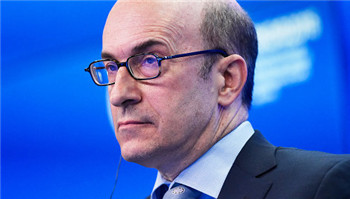
Kenneth Rogoff has long warned of a potential financial crisis in China.
肯尼思·罗格夫(Kenneth Rogoff)早就对中国潜在的金融危机发出过警告。
Mr. Rogoff, a professor of economics at Harvard University, accurately predicted the eurozone debt crisis and for years has been telling anyone who would listen that China posed the next big threat to the global economy. He is starting to look right, again.
罗格夫是哈佛大学的经济学教授,他曾准确地预测了欧元区的债务危机,多年来他也一直在对人们说,中国将给全球经济带来下一个大的威胁。这回,他又看起来是对的了。
“In economics, things take longer to happen than you think they will, and then they happen faster than you thought they could,” Mr. Rogoff said on Monday from Cambridge, Mass., repeating a favorite line from Rudi Dornbusch, the German economist. (Mr. Rogoff sat in on Mr. Dornbusch’s class at M.I.T. in 1977.)
“就经济上的事情而言,其发生所需的时间比你认为的要长,但发生的速度比你认为可能的要快,”罗格夫周一在马萨诸塞州的坎布里奇,重述了德国经济学家鲁迪·多恩布什(Rudi Dornbusch)常说的一句话(罗格夫1977年曾在麻省理工学院旁听过多恩布什的课)。
Mr. Rogoff, who is a chess grandmaster, has made a career of studying financial crises. After the 2008 financial crisis, Mr. Rogoff co-wrote “This Time Is Different,” a seminal book that examined eight centuries of financial crises.
罗格夫还是国际象棋特级大师,他把研究金融危机当作一生的职业。2008年的金融危机之后,罗格夫与他人合著了一部具有重大意思的书《这次不同》(This Time Is Different),书中探讨了八个世纪里发生的金融危机。
Every financial crisis, he and his co-author, Carmen M. Reinhart, concluded, stems from the same simple problem: too much debt.
他和书的共同作者卡门·M·莱因哈特(Carmen M. Reinhart)得出的结论是,每次经济危机都源于同一个简单的问题:太多的债务。
To understand the wild machinations of the stock market in recent days in the United States and abroad, you need to look no further than China’s astounding debt load and sputtering economy — and its ability to infect the rest of the world.
要想了解最近几天美国及世界股市疯狂背后的原因,你不需要更多的知识,只要看看中国惊人的债务负担和泄气的经济就够了,再就是中国影响世界各地的能力。
“China is the classic ‘This time is different’ story,” Mr. Rogoff said, rattling off all the different rationalizations for why the country convinced itself — and many others — that it could load up on debt but was somehow immune to the laws of economic gravity. He cited the government’s control over the markets, the hundreds of millions of workers migrating to cities and the country’s saving rate of about 30 percent of disposable income as just some of the reasons China was said to be impervious to a severe downturn.
罗格夫说,“中国是《这次不同》的一个典型故事。”他列举了中国所有不同的、用来说服自己和许多其他人的理性解释,为什么中国可以让债务不断增长,却有某种办法能让自己不受经济学规律的限制。他列举的理由包括,政府对市场的控制、数百万农民工进城,以及高达人均可支配收入30%的国内储蓄率,据说这些都是人们认为中国经济不会严重衰退的理由。
“It’s very vulnerable,” Mr. Rogoff added. “There is a lot of debt.”
“目前的经济岌岌可危,”罗格夫补充道。“有大量的债务。”
How much debt remains an open question, given the opacity of China’s market. The country’s debt load rose from $7 trillion in 2007 to $28 trillion by mid-2014, according to a report published earlier this year by the consulting firm McKinsey & Company, China. “At 282 percent of G.D.P., China’s debt as a share of G.D.P., while manageable, is larger than that of the United States or Germany,” said the McKinsey study. “Several factors are worrisome: Half of loans are linked directly or indirectly to China’s real estate market, unregulated shadow banking accounts for nearly half of new lending, and the debt of many local governments is likely unsustainable.”
鉴于中国市场的不透明度,债务多少的问题仍然没有定论。咨询公司麦肯锡(McKinsey& Company)中国公司今年早些时候发布的一份报告称,中国的债务负担从2007年的7万亿美元增加到2014年中期的28万亿美元。“中国的债务规模是国内生产总值(GDP)的282%,这个比例虽然处于可控状态,但高于美国或德国,”麦肯锡的研究称。“有几个因素令人担忧:一半的贷款都和中国的房地产市场有直接或间接联系,不受监管的影子银行占了新增贷款的将近一半,许多地方政府的债务可能缺乏可持续性。”
The question then becomes how interconnected China’s economy is to the rest of the world. That’s exactly what investors have been trying to determine over the last several weeks as China’s government has devalued its currency and tried — and failed — to stabilize its plummeting stock market. The drop has been worsened, in part, by debt as overextended Chinese speculators who borrowed money to buy stocks are now being forced to sell, creating a vicious cycle.
因此问题变为,中国经济与世界其他地区有什么样的关联。这正是投资者们在过去几周里,眼看着中国政府采取让人民币贬值、并试图稳定股市大跌但最终失败等做法时,一直试图搞明白的问题。股市的下跌进一步恶化,这部分是债务造成的,因为借钱买股票的中国投机者曾过度贷款,而现正他们被迫出售股票,形成恶性循环。
“How does all that ricochet to emerging markets?” Mr. Rogoff said in discussing the effect of China’s slowdown on commodity producers like Brazil, whose economy is in a tailspin. “Look at Russia. It’s amazing they haven’t had a financial crisis yet.”
“所有这些给新兴市场带来了怎样的反弹呢?”罗格夫在讨论中国经济放缓对巴西等大宗商品生产国的影响时问道,巴西的经济情况目前一片混乱。“看看俄罗斯吧。惊人的是,他们居然还没有发生金融危机。”
Mr. Rogoff is not the first person to identify China as a potential risk. Earlier this year, this column highlighted the views of Henry M. Paulson Jr., the former Treasury secretary and a Sinophile, who said, “Frankly, it’s not a question of if, but when, China’s financial system will face a reckoning and have to contend with a wave of credit losses and debt restructurings.” And the hedge fund manager James Chanos has been sounding the alarm on China for years, recently declaring, “Whatever you might think, it’s worse.”
罗格夫并不是认定中国存在潜在风险的第一人。今年早些时候,本栏目曾介绍过前财政部长、亲中国人士小亨利·M·保尔森(Henry M. Paulson Jr.)的观点,他说,“坦率地讲,中国金融体系将面临一次总清算,不得不对付一轮信贷损失和债务重组问题,这不是会不会发生、而是何时发生的问题。”而对冲基金经理詹姆斯·S·查诺斯(James S. Chanos)多年来一直在对中国的问题发出警告,他最近宣称,“不管你可能怎样认为,都只会更糟糕。”
There are, of course, significant political reasons China needs to convince the world and its own citizens that it can manage its convulsing financial markets and slowing economy. “Financial meltdown leads to a social meltdown, which leads to a political meltdown,” Mr. Rogoff said. “That’s the real fear.”
中国需要说服世界和本国公民,它能管理本国震荡的金融市场和经济增长放缓的问题,当然是有明显的政治原因的。“金融危机导致社会崩溃,从而导致政治危机,”罗格夫说。“这才是真正可怕的事情。”
Mr. Rogoff pointed to another factor that has contributed to China’s financial woes.
罗格夫指出,给中国金融制造问题的还有另一种因素。
“The crisis in Tianjin fed into the mix,” he said, referring to the deadly explosion on Aug. 12 in the port city, which killed more than 100 people. Mr. Rogoff said the explosion had undermined the credibility of the Chinese government because so many questions remained unanswered, and the response had been inadequate.
“天津的危机也助长了这个问题,”他说,他指的是8月12日发生在这个港口城市的致命爆炸,事件已造成100多人死亡。罗格夫说,爆炸摧毁了中国政府的公信力,因为许多问题至今仍没有答案,而且政府对爆炸的响应很不充分。
So does Mr. Rogoff believe that China is headed for a terrible “hard landing” that will lead to a global recession?
那么说,罗格夫是否认为,中国正在走向一个可怕的“硬着陆”,并将导致全球经济衰退呢?
Well, despite the market tumult and his persistent warnings, Mr. Rogoff says he believes that the last several weeks have raised the prospects of a meaningful crisis. But with China’s trillions of dollars in reserves, he thinks the country may have sufficient tools to prevent a calamity that spreads across the globe — at least for now.
这个嘛,尽管市场出现动荡,他也曾不断发出警告,罗格夫说他认为,过去几周已提出了重大危机的可能性问题。但考虑到中国仍有数万亿美元的外汇储备,他认为中国也许有足够的工具来防止灾难蔓延到世界各地,至少目前如此。
“If you had to bet,” Mr. Rogoff said, “you’d still bet they’d pull it out.”
罗格夫说,“如果必须打赌的话,还是赌他们能摆脱困境为好。”












